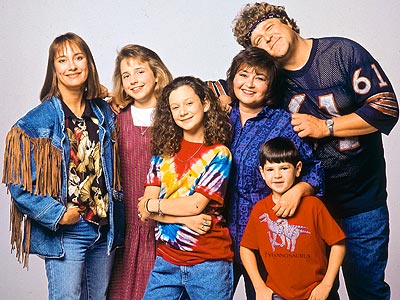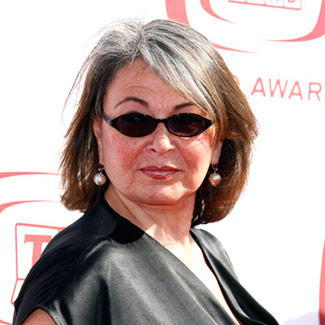Roseanne, the show that made Roseanne an icon, was a staple of my childhood TV watching. At the time, all I knew was that it was funny, but after reading a recent New York Magazine interview with Barr, I have a whole new respect for the struggle she went through to put her vision on the air for me to giggle along with.
It’s still difficult for female writers to make it in the television industry, but the 1988 Roseanne Barr, a stand-up comedian who had been discovered while doing her act on the Johnny Carson’s Tonight Show, quickly discovered that she wasn’t expected to have a whole lot of say over what happened to the show.
There were the executives who didn’t care what she wanted, a show runner (aka, the boss on a TV show’s set) who got all the credit for creating the show, and an agent who just hadn’t paid enough attention to  make sure Roseanne got what she needed. It’s little wonder one of the many TV traditions Roseanne pioneered was the “public meltdown.”
make sure Roseanne got what she needed. It’s little wonder one of the many TV traditions Roseanne pioneered was the “public meltdown.”
But, not one to let a few obstacles get in her way, Roseanne dealt with her “meltdown” by getting organized:
“To survive the truly hostile environment on set, I started to pray nonstop to my God, as working-class women often do, and to listen nonstop to Patti Smith’s ‘People Have the Power.’ I read The Art of War and kept the idea, ‘He that cares the most, wins,’ upmost in my mind. I knew I cared the most, since I had the most to lose. I made a chart of names and hung them on my dressing-room door; it listed every person who worked on the show, and I put a check next to those I intended to fire when Roseanne became No. 1, which I knew it would.”
And she meant it too. When Roseanne became a hit and Roseanne proved she was truly the lady in charge, she fired everyone on her list and hired people who she found talented, supportive and fair. She was one angry lady — and still is in some ways — but she protected and nurtured the little people working for her, and the not so little people as well. George Clooney numbers among the people who helped Roseanne fight to the top:
“When the show went to No. 1 in December 1988, ABC sent a chocolate ‘1’ to congratulate me. Guess they figured that would keep the fat lady happy — or maybe they thought I hadn’t heard (along with the world) that male stars with No. 1 shows were given Bentleys and Porsches. So me and George Clooney [who played Roseanne Conner’s boss for the first season] took my chocolate prize outside, where I snapped a picture of him hitting it with a baseball bat. I sent that to ABC.”
Roseanne Barr’s unique combination of anger, attitude and loyalty to those who she feels deserve it created one of the most durable shows on television and launched a lot of incredible careers (including those of Joss Whedon and Judd Apatow). But it may not have given her a happy life. Roseanne doesn’t hide the fact that she’s struggled with bitterness her whole life, before, after and during the high points of her fame. But she seems to have turned all that bitterness into fuel, then managed to survive the flames she built out of it.
“But, again, I’m not bitter. I’m really not. The fact that my fans have thanked and encouraged me for doing what I used to get in trouble for doing (shooting my big mouth off) has been very healing. And somewhere along the way, I realized that TV and our culture had changed because of a woman named Roseanne Conner, whom I am honored to have written jokes for.”
I’m not sure I quite believe Roseanne when she says she’s not bitter, but I think we can all learn something from her struggles with that bitterness, because life is full of things that can make you bitter. The key is learning to see past the bitterness. To let the good outweigh the bad. Find the thing about yourself that deserves to be honored and give that part of you the credit it’s due.
****

I didn’t know that story about the chocolate #1 – that is both hilarious and ridiculous. I would have LOVED to see the photo of Clooney smashing it outta the park. LOL